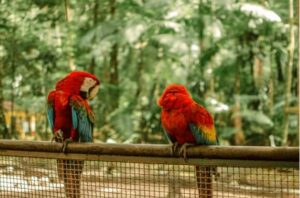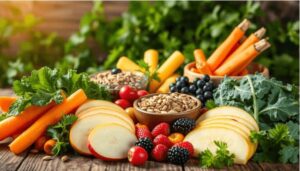Providing the right nutrition is essential for keeping pet birds happy and healthy. A well-balanced diet plays a crucial role in preventing health issues and ensuring a long, fulfilling life for your feathered companion.

Understanding the Best Diet for Pet Birds
Pet birds have unique dietary requirements. Their meals should consist of a combination of pellets, fresh fruits, and vegetables. While nuts and seeds can be offered occasionally, they should not be the main component of their diet. Proper nutrition requires effort, but the rewards include a healthier, more energetic pet bird.
By offering a well-rounded diet, bird owners can help their pets thrive and enjoy a vibrant life.
Key Points to Remember
- A well-balanced diet is vital for a pet bird’s overall health and happiness.
- Pet birds benefit from a mix of pellets, fresh produce, and occasional nuts and seeds.
- Understanding avian nutrition helps in formulating an appropriate diet plan.
- Commercial bird foods should meet the specific nutritional needs of pet birds.
- A nutritious diet helps prevent health issues and promotes longevity.
- Consulting an avian veterinarian or nutritionist ensures your pet bird’s diet is tailored to its needs.
Basics of the Best Diet for Pet Birds
A balanced diet is fundamental for a pet bird’s well-being. With a wide variety of food options available, choosing the best ones can feel overwhelming. A well-structured feeding plan makes the process simpler.
Essential Nutrients for Pet Birds
Pet birds require proteins, carbohydrates, healthy fats, vitamins, and minerals to maintain good health. A carefully designed feeding schedule ensures they get the necessary nutrients for optimal growth and energy levels.
Daily Nutritional Needs
A pet bird’s dietary requirements depend on its species, age, and activity level. Their meals should be energy-rich but not excessively fatty. A well-structured feeding plan helps ensure all their nutritional needs are met.
Signs of Good Nutrition
A well-fed pet bird exhibits vibrant feathers, clear and bright eyes, and an active demeanor. They are playful, alert, and maintain a healthy appetite. Ensuring a balanced diet promotes their overall health and longevity.
By following fundamental avian nutrition principles, owners can create an optimal feeding routine that supports their pet bird’s well-being.
Best Commercial Bird Foods for Pet Birds
Commercial bird foods offer a convenient way to provide a balanced diet for pet birds. Many reputable brands produce specialized formulas catering to different bird species and life stages. A well-chosen commercial diet should contain essential proteins, carbohydrates, and vitamins.
Popular brands such as Kaytee, ZuPreem, and Lafeber’s provide high-quality seed and pellet-based diets tailored for pet birds. Selecting the right food depends on several factors:
- Nutritional Value: Ensure the food meets your pet bird’s dietary needs.
- Taste and Preference: Choose a food your pet bird enjoys eating.
- Brand Reputation: Opt for trusted and well-reviewed products.
Recommended Commercial Bird Foods
| Brand | Product | Nutritional Benefits |
|---|---|---|
| Kaytee | Forti-Diet | High-protein, nutrient-rich formula |
| ZuPreem | Nature’s Promise | Made with wholesome, natural ingredients |
| Lafeber’s | Nutri-Berries | Balanced nutrition in an engaging, berry-shaped form |
By considering these factors and selecting a premium-quality bird food, you can help ensure your pet bird receives essential nutrients. Always follow feeding guidelines and consult an avian veterinarian if you need dietary advice.
Creating a Balanced Daily Menu for Your Parrot
Planning your parrot’s daily diet is essential for their health and happiness. Their nutritional needs, activity levels, and preferences should be considered when creating a meal plan. A well-structured daily menu ensures your parrot gets the right balance of nutrients.
A proper feeding guide includes a mix of pellets, fresh fruits, vegetables, and occasional treats. Here’s a sample daily feeding schedule:
| Meal Time | Food Options |
|---|---|
| Morning | Pellets, fresh fruits, and vegetables |
| Afternoon | Healthy snacks such as carrots, sweet potatoes, and apples |
| Evening | A balanced mix of pellets, fruits, and vegetables |
Tips for Creating a Daily Menu:
- Provide a variety of food options to ensure balanced nutrition.
- Include a mix of pellets, fruits, vegetables, and treats.
- Adjust portion sizes based on activity level and species.
- Consult an avian vet or feeding guide for optimal nutrition.
By carefully selecting your parrot’s meals, you can ensure they stay active, healthy, and happy.
Seasonal Diet Adjustments

Just as humans adjust their diets based on seasons, parrots also benefit from seasonal changes in their meals. Different weather conditions can impact their dietary needs.
Key Seasonal Adjustments:
- Winter: Increase calorie intake to help maintain body warmth.
- Summer: Add hydrating fruits and vegetables to keep them cool.
- Spring & Fall: Introduce a mix of seasonal produce to provide variety.
By adjusting your parrot’s diet seasonally, you ensure they receive optimal nutrition all year long.
Special Dietary Needs for Different Parrot Species
Different parrot species have unique dietary requirements. A well-balanced feeding plan should cater to these differences.
| Parrot Species | Dietary Needs |
| African Grey | High calcium and vitamin D intake |
| Macaws | A mix of fruits, vegetables, and proteins |
| Cockatoos | Fiber-rich, low-fat diet |
Providing species-specific nutrition is key to your parrot’s well-being.
Supplementing Your Parrot’s Diet

While a balanced diet is crucial, some parrots may require additional supplements. Always consult a veterinarian before adding supplements.
| Supplement | Benefits |
| Vitamin A | Supports vision and immunity |
| Calcium | Essential for strong bones and beak health |
| Probiotics | Aids digestion and gut health |
Proper supplementation enhances your parrot’s health when used appropriately.
Food Storage and Freshness Tips(Best Diet for Pet Birds)
To keep your parrot’s food fresh and safe:
- Store food in a cool, dry place.
- Use airtight containers to prevent moisture exposure.
- Keep food away from direct sunlight and heat.
- Check for signs of spoilage, such as mold, foul smell, or discoloration.
Using a rotation schedule ensures freshness and prevents waste.
Common Feeding Mistakes to Avoid

Many parrot owners unknowingly make feeding mistakes that can lead to health issues.
Avoid these common errors:
- Overfeeding or underfeeding.
- Providing an unbalanced diet lacking essential nutrients.
- Not ensuring a constant supply of fresh water.
- Failing to rotate food for variety.
- Ignoring signs of nutritional deficiencies.
By being mindful of these mistakes, you can support your parrot’s long-term health.
Monitoring Your Parrot’s Dietary Health
Observing your parrot’s behavior, weight, and overall health is crucial in maintaining a proper diet.
| Health Indicator | Normal Range | Warning Signs |
| Weight | Varies by species | Sudden weight gain or loss |
| Appetite | Consistent eating habits | Decreased or excessive eating |
| Droppings | Normal color and consistency | Discolored, runny, or abnormal droppings |
Regular vet checkups and weight tracking can help detect potential health issues early.
Conclusion
Providing the best diet for pet birds is one of the most important responsibilities of a bird owner. A well-balanced diet consisting of pellets, fresh fruits, vegetables, and occasional treats ensures your pet bird remains healthy and active. Consulting an avian veterinarian for personalized dietary advice can further enhance your pet bird’s well-being and longevity.











